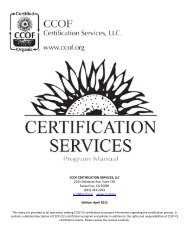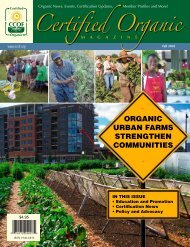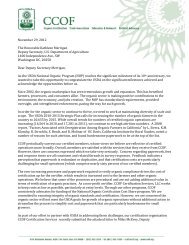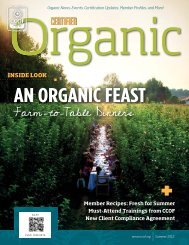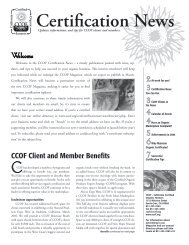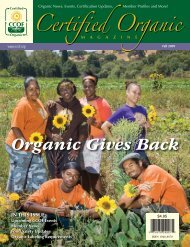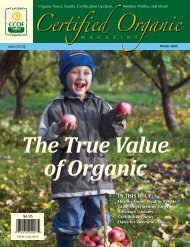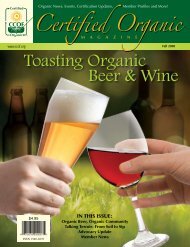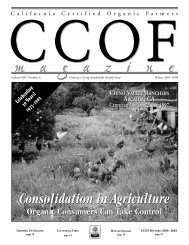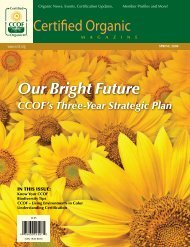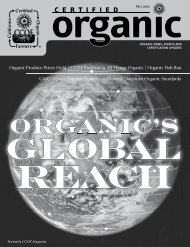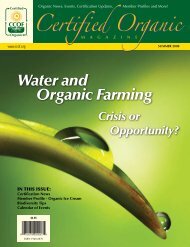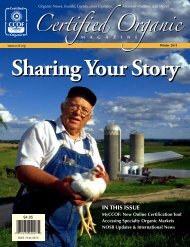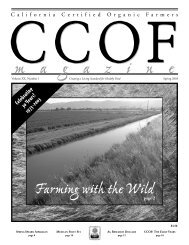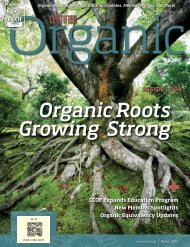Herstory: Women in Organic Agriculture - CCOF
Herstory: Women in Organic Agriculture - CCOF
Herstory: Women in Organic Agriculture - CCOF
Create successful ePaper yourself
Turn your PDF publications into a flip-book with our unique Google optimized e-Paper software.
Cynthia Lashbrook<br />
RIVERDANCE FARMS • BIG VALLEY CHAPTER<br />
CY NTHIA<br />
L ASHBROOK’ S<br />
environmental consciousness<br />
blossomed dur<strong>in</strong>g her years <strong>in</strong><br />
college <strong>in</strong> the 1970’s. Where those seeds<br />
of consciousness came from is a different<br />
matter. Her brother, who was <strong>in</strong>to Mother<br />
Earth News, gave her a copy of his favorite<br />
magaz<strong>in</strong>e to read. Around the same time,<br />
her great aunt gave her a seed catalogue<br />
through which she perused and wondered<br />
what she could grow. Although <strong>in</strong>terested<br />
<strong>in</strong> Russian and Law at the time, <strong>in</strong>fluences<br />
like her brother and great aunt helped her<br />
move towards agriculture. “I th<strong>in</strong>k I was<br />
an <strong>in</strong>nate ecologist,” Cynthia claims with<br />
a smile.<br />
Cynthia and her husband purchased 20<br />
acres of orchard land <strong>in</strong> 1987 and began<br />
rais<strong>in</strong>g a family. Work<strong>in</strong>g the orchard was<br />
a little overwhelm<strong>in</strong>g with two kids and a<br />
full-time job at a chemical company. With<br />
her children grow<strong>in</strong>g up, Cynthia started<br />
th<strong>in</strong>k<strong>in</strong>g about the chemicals they had<br />
been us<strong>in</strong>g <strong>in</strong> the orchard. She wanted her<br />
kids to be able to roll around on the<br />
orchard floor and not worry about it. It<br />
was then, <strong>in</strong> 1990, that she and her husband<br />
decided to go organic. “When the<br />
truth hit me, it made so much sense,” says<br />
Cynthia. She had also considered the soil,<br />
that it was breath<strong>in</strong>g and alive with life.<br />
Meet<strong>in</strong>g Glenn Anderson and other<br />
organic growers also opened her eyes to the<br />
health and environmental benefits of farm<strong>in</strong>g<br />
organically. Glenn became a source for<br />
“I th<strong>in</strong>k I was an <strong>in</strong>nate ecologist.”<br />
consult<strong>in</strong>g and support <strong>in</strong> Cynthia’s early<br />
years of organic grow<strong>in</strong>g.<br />
As a PCA (pest control advisor) s<strong>in</strong>ce<br />
1991, she attended <strong>in</strong>dependent ag consult<strong>in</strong>g<br />
meet<strong>in</strong>gs and conferences <strong>in</strong> the<br />
area. At these meet<strong>in</strong>gs, she reconnected<br />
not only with people, but also with her<br />
feel<strong>in</strong>gs about ecological farm<strong>in</strong>g, and<br />
relearned sound susta<strong>in</strong>able farm<strong>in</strong>g practices.<br />
She also met her present farm<strong>in</strong>g<br />
partner, Bill Thompson, at these meet<strong>in</strong>gs.<br />
They found they had a lot <strong>in</strong> common.<br />
Learn<strong>in</strong>g from Bill’s experience and<br />
apply<strong>in</strong>g a lot of her own, she entered <strong>in</strong>to a<br />
partnership <strong>in</strong> Four Seasons Ag Consult<strong>in</strong>g,<br />
a bus<strong>in</strong>ess that Bill had started <strong>in</strong> 1979.<br />
Cynthia herself started a retail bus<strong>in</strong>ess<br />
the previous year <strong>in</strong> 1992, Liv<strong>in</strong>g Farm<br />
Systems, offer<strong>in</strong>g seeds, compost, fertilizers<br />
and beneficial <strong>in</strong>sects to organic growers.<br />
As a woman consultant with a retail bus<strong>in</strong>ess,<br />
many people were quick to dismiss<br />
her, not view<strong>in</strong>g her as an equal. “But when<br />
I mentioned my farm, people would wake<br />
up and take notice,” says Cynthia.<br />
The land that she farms at present was<br />
purchased <strong>in</strong> 1996, with an adjacent parcel<br />
available <strong>in</strong> 1999. Now divorced, Cynthia<br />
lives <strong>in</strong> a home on this land with her children.<br />
Approximately 58 of the 70 acres she<br />
and Bill manage are <strong>in</strong> farmland production,<br />
with the other rema<strong>in</strong><strong>in</strong>g acreage as<br />
riparian habitat. When they first acquired<br />
this new acreage, the orchard appeared<br />
stressed and over its peak. But with a spr<strong>in</strong>kler<br />
system already <strong>in</strong> place, it wasn’t very<br />
hard to revive the trees. In addition to walnuts<br />
and pecans, Cynthia and Bill also<br />
grow blueberries, cherries and hay on the<br />
newer parcel.<br />
In shar<strong>in</strong>g the work of the land, both<br />
make plann<strong>in</strong>g decisions, while Bill often<br />
tends to the equipment and<br />
Cynthia takes care of the<br />
paperwork. With the retail<br />
bus<strong>in</strong>ess, ag consult<strong>in</strong>g, and<br />
work<strong>in</strong>g their land, Cynthia<br />
has very full days. Beg<strong>in</strong>n<strong>in</strong>g<br />
early <strong>in</strong> the morn<strong>in</strong>g, after<br />
mak<strong>in</strong>g some phone calls and<br />
review<strong>in</strong>g paperwork, she<br />
often visits several of her<br />
consult<strong>in</strong>g customers, many of<br />
whom are <strong>in</strong> transition to organic<br />
production. While her clients are<br />
<strong>in</strong>terested <strong>in</strong> grow<strong>in</strong>g organic, her laborers<br />
have sometimes questioned her choice.<br />
They have asked why they have to weed<br />
the fields when she could just spray to<br />
control weeds. Cynthia laughs, “I tell them<br />
that if I sprayed, they wouldn’t have jobs.”<br />
The reasons not to use synthetic highly<br />
toxic chemicals on the land are very clear<br />
to her.<br />
Today Cynthia is regarded as someth<strong>in</strong>g<br />
of an expert. She has helped many conventional<br />
growers significantly cut their active<br />
<strong>in</strong>gredient <strong>in</strong>put, and she has also advised<br />
some farmers on different production practices<br />
that help them ma<strong>in</strong>ta<strong>in</strong> their niche<br />
markets. In addition to her ag consult<strong>in</strong>g,<br />
the county has sometimes asked her to talk<br />
with other farmers regard<strong>in</strong>g dormant<br />
sprays, their uses and effects. (Dormant<br />
sprays are petroleum-based oils used to<br />
suppress disease and suffocate <strong>in</strong>sect pests,<br />
generally used on pre-bloom trees. Some<br />
narrow range dormant sprays are regulated<br />
for use <strong>in</strong> organic production.)<br />
All of her experience, however, cannot<br />
completely solve problems on her own<br />
land. One of her ma<strong>in</strong> challenges is deal<strong>in</strong>g<br />
with ground squirrels who love eat<strong>in</strong>g the<br />
nuts <strong>in</strong> her orchard. She also has to worry<br />
about controll<strong>in</strong>g the husk fly, which<br />
might require an <strong>in</strong>novative approach.<br />
To control the fly, she is consider<strong>in</strong>g<br />
<strong>in</strong>troduc<strong>in</strong>g chickens to feed on the<br />
orchard floor, eat<strong>in</strong>g the husk fly that lays<br />
dormant <strong>in</strong> the ground for up to ten<br />
months. She is also consider<strong>in</strong>g burrows<br />
or llamas to help control weeds and act<br />
as protective animals aga<strong>in</strong>st predators of<br />
chickens. Fertility is another challenge <strong>in</strong><br />
the orchard. “Th<strong>in</strong>k<strong>in</strong>g ahead is necessary<br />
when consider<strong>in</strong>g fertility.” Cynthia<br />
ponders her experience, “The second<br />
year was a challenge for us.”<br />
Challenges aside, Cynthia is very happy<br />
with her choice to farm organic—for<br />
herself, her children, the land, and for the<br />
environment. Although not an organic<br />
farmer her entire life, hav<strong>in</strong>g relearned<br />
and reconnected with her <strong>in</strong>nate organic<br />
convictions, Cynthia says with a smile,<br />
“<strong>Organic</strong> is me.”<br />
The Newsletter of <strong>CCOF</strong>



